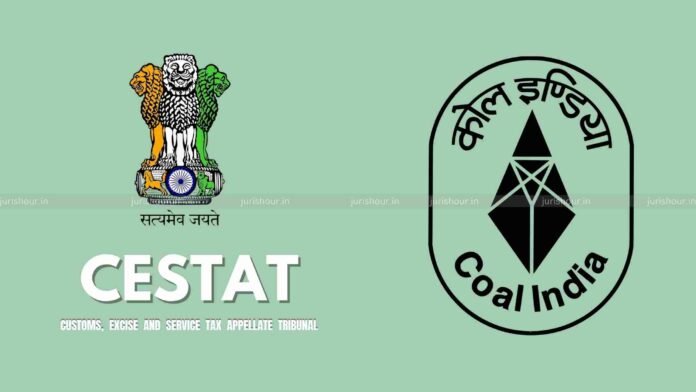The Customs, Excise and Service Tax Appellate Tribunal (CESTAT) Mumbai has set aside major customs duty demands raised against Coal India Ltd (CIL) and GMMCO Ltd in connection with the import of 190T Caterpillar Rear Dumpers from the United States, holding that the authorities erred in treating the consignments as “pre-assembled vehicles” instead of “completely knocked down (CKD)” kits eligible for concessional duty.
The bench of Ajay Sharma (Judicial Member) and C.J. Mathew (Technical Member) has observed that the adjudicating authority had misapplied the interpretative rules and extended them to the wrong context, concluding that “the reasoning adopted by the Commissioner was neither legal nor proper.”
The appellant, Coal India Ltd. and GMMCO Ltd had entered into contracts with Caterpillar Inc., USA, to procure 102 high-capacity dumpers for its subsidiaries—Northern Coalfields Ltd and Eastern Coalfields Ltd—for large-scale mining projects. The vehicles were shipped in CKD form due to their massive size and were to be assembled on-site by trained engineers of GMMCO Ltd.
The imports had earlier been seized by Mumbai Customs in November 2022, triggering a detailed investigation and prolonged litigation, now resolved in favor of the state-owned miner.
The case stemmed from the seizure of multiple consignments imported by CIL and its agents, GMMCO Ltd and Gainwell Commosales Pvt. Ltd., which were declared as CKD kits meant for assembly at Indian mining sites. Customs officials at Mumbai Port, however, concluded that key components such as the engine, gearbox, and transmission mechanisms were “pre-assembled,” disqualifying them from concessional duty under Notification No. 50/2017-Cus. Consequently, the Commissioner of Customs raised demands totaling over ₹155 crore in differential duty and imposed penalties for alleged misdeclaration.
The appellant contended that the amount in dispute related to a transaction, involving the other appellant, even if it be tri-partite, located in the territory of India and themselves, covering consideration for activity to be undertaken in domestic area and subjected to domestic taxation. He pointed out that it was a specific quid pro quo between them with no concern to the seller in the course of international trade. He contended that the ‘declared value’ has not been questioned nor rule 12 of Customs Valuation (Determination of Value of Imported Goods) Rules, 2007 ever invoked for such purpose and ‘supplementing value’ is contingent only upon payment due, either directly or indirectly, to seller of, and only for, goods, with even that, strictly within the stipulations in rule 10 of Customs Valuation (Determination of Value of Imported Goods) Rules, 2007 if constitutional propriety were not to be molested.
The tribunal also dismissed the department’s contention that an additional ₹30 lakh per dumper, paid to GMMCO Ltd for assembly and commissioning in India, should be added to the assessable value. It observed that this amount related to post-importation activities carried out domestically and could not be treated as part of the import transaction value.
“There is no evidence that any portion of the payment accrued to the foreign supplier or constituted consideration for the goods at the time and place of importation,” the order noted, emphasizing that customs duty can be levied only on value at importation, not on subsequent services.
The tribunal devoted considerable analysis to the meaning of “pre-assembled” within the exemption notification. It ruled that “preassembled” refers to independent identifiable units (like engines and transmissions) which are not yet integrated into a motor vehicle, thereby qualifying as CKD kits.
“A completely knocked down kit, including engine, gearbox and transmission mechanism presented separately, is not a motor vehicle till assembled,” the bench stated, clarifying that only when these components are fitted onto a chassis does the article become a complete vehicle liable to higher duty.
CESTAT criticized the customs authorities for importing concepts from contractual and commercial law into customs assessment, stating that such an approach was “without legal authority.” It also found fault in relying on inspection reports and engineer certificates that allegedly lacked technical depth and failed to prove any deliberate misdeclaration by the importers.
Further, the tribunal noted that classification of goods under the tariff schedule was never in dispute, and the Commissioner had wrongly ventured into reclassifying sub-assemblies within already accepted categories of motor vehicles.
Setting aside the two Orders-in-Original dated May 25, 2022, and January 17, 2023, the tribunal concluded that CIL and GMMCO Ltd were entitled to concessional duty applicable to CKD kits. The addition of ₹30 lakh per dumper to assessable value was illegal and unsustainable. The customs authorities’ reasoning for treating the kits as pre-assembled was erroneous.
The appeals were allowed in full, and the corresponding demands, interest, and penalties were quashed.
Case Details
Case Title: GMMCO Ltd Versus Commissioner of Customs (Import-I)
Case No.: CUSTOMS APPEAL NO: 87159 OF 2022
Date: 03/09/2025
Counsel For Appellant: Vipin Jain, Dr. Sujay Kantawala
Counsel For Respondent: Shambhoo Nath, Special Counsel
Read More: Sameer Wankhede Promotion: Delhi HC Dismisses Dept’s Review; Imposes Rs. 20k Cost Citing Concealment

